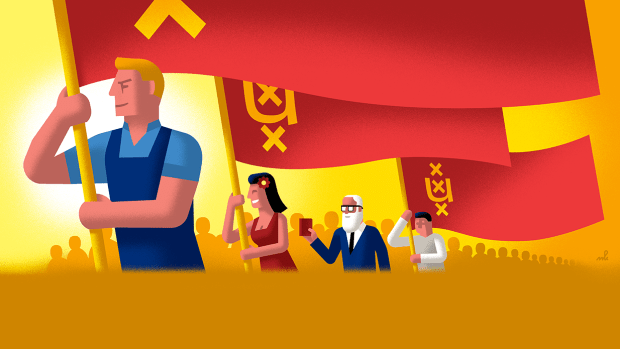
Strike at UvA on Monday: “There is a hint of revenge cuts”
On 17 March, UvA students and staff will strike against budget cuts in higher education. The protest is part of a nationwide relay strike by universities and some colleges - the first ever relay strike, according to Rens Bod, UvA professor and initiator of WOinActie.
On Monday, Leiden University kicked off the relay strike, which will take place at a total of 11 universities in the coming weeks. In each city, teaching and research will be halted for one day. For UvA students, there is no compulsory attendance on the day of the strike, except for exams and clinical practicals. The missed lectures and tutorials will not be rescheduled.
How special is this relay strike?
“This is the first ever relay strike for higher and scientific education. In the late 1980s, there were local strikes at individual university departments against reorganisations. But not nationwide. So it is special that 11 universities are now participating.”
Why are so many colleges and universities participating?
“Because of the drastic budget cuts. Initially the amount was two billion, but after our demonstrations last year, 1.2 billion euros of that now remains. That gives us hope taking action helps. Still, the 0.8 billion euros we got back is not enough. This is because it is not an additional investment, it is a deficit.”
“In 2021, PwC released a research report on the funding of higher education and research, among others. It showed that there was underfunding. As a result, universities could no longer perform their tasks properly. In response to the report, start-up grants for new university lecturers, and incentive grants for older staff, were introduced. All of these have since been abolished. This is unacceptable. So universities are far from satisfied.”
What impact do the cuts actually have on the UvA?
“The UvA does not currently have a major financial problem, especially compared to universities such as Utrecht and Leiden. UvA president Jan Lintsen recently said in an interview with Folia that redundancies can be avoided if good choices are made. However, that means there will be no more money for certain courses. These will disappear, to the detriment of the quality of education. The cabinet keeps talking about ‘the knowledge society’ - it says so 85 times in the ‘hoofdlijnenakkoord’ - while they are going to cut 1.2 billion euros from academic education.”
And just to clarify: what is the purpose of this strike again?
“That is very clear: all cuts must be taken off the table.”
Is that realistic?
“The parties in favour of the cuts, which will be voted on 25 March in the , do not have a majority in the Senate. Other parties are very worried and a large part of the opposition does not want to vote. Also, the Senate vote has already been postponed twice. Should the cuts fail to be taken off the table, we hope the strike will ensure that new choices are made on how the money for education is spent in the Spring Memorandam. We are trying to save what can be saved.”
It is often thought to take the necessary money away from Defence. Now that doesn’t seem like such a good idea. So where should the government get the money from?
“The government could create more room in the overall budget, which would increase the government’s debt. Moreover, there seem to be financial windfalls; economic growth is higher than expected. The government will then have billions left. It is unnecessary to make cuts so severe. I think there this is a case of revenge cuts. That is, radical-right governments that have a difficult relationship with universities - often critical of them - decide to cut education for ideological reasons.”
What is the programme on Monday?
“We start Monday at 9am with picket lines, rows of striking workers. They will then stand outside at Roeterseiland campus, the Oudemanhuispoort and possibly some other places with leaflets and banners. An hour later, we make banners together, followed by discussions. Then there will be a march from the REC to Dam Square.”
“We expect around three thousand people to walk along, hopefully more. There will be a brass band performance from 13:30, and from 14:00 the real programme will start until 15:00. Several speakers will explain what the cuts mean for the UvA and the HvA. UvA College President Edith Hooge will also be present to voice their support together with HvA College President Jopie Nooren.”

